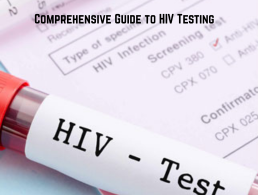Table of Contents
The human immunodeficiency virus (HIV) remains one of the most significant public health challenges worldwide. Early detection is critical, not only for starting timely treatment but also for preventing further transmission. This article serves as a complete guide to different HIV testing methods, the role of p24 antigen detection, rapid screening options, and how to access reliable HIV test kit suppliers.
We aim to answer the most common questions people have — whether they are searching for “HIV testing near me” or exploring advanced diagnostic options like the p24 antigen test. From in-clinic procedures to home-based test kits, we’ll cover every step so you can make informed decisions about your health.

Where Can I Find Reliable HIV Testing Near Me?
Finding HIV testing services in your local area often starts with searching for government clinics, hospitals, NGOs, or authorized private laboratories. Many countries operate free or low-cost testing centers, while others offer confidential walk-in clinics.
- Tip: Look for services affiliated with public health agencies or accredited laboratories to ensure quality and accuracy.
- Online search tip: Search “HIV testing near me” + your city name for precise local results.
How Do I Search for an HIV Test Near Me and Book an Appointment?
When searching for “HIV test near me”:
- Use health ministry websites or government directories for authorized centers.
- Check telemedicine platforms that let you book lab appointments.
- Many labs now provide home sample collection for convenience and privacy.
What is the p24 Antigen Test and How Does it Work?
The p24 antigen test detects a specific protein (p24) found in the HIV virus.
- Key Advantage: It can detect HIV as early as 2–4 weeks after exposure, even before antibodies form.
- Often used in fourth-generation HIV tests that combine p24 antigen detection with antibody screening for faster diagnosis.
How Accurate is the p24 Antigen Test?

When performed by an accredited lab, the p24 antigen test has high sensitivity and specificity.
- False positives are rare but possible, which is why confirmatory testing (e.g., Western blot or PCR) is recommended.
- Combining p24 with antibody testing increases detection accuracy during early infection stages.
What is the HIV Rapid Screen Test?
The HIV rapid screen test is a point-of-care test that delivers results within 15–30 minutes.
- Uses either blood from a finger prick or oral fluid.
- Commonly used in community outreach programs, emergency rooms, and developing regions.
How Accurate are HIV Rapid Screen Tests?
While rapid tests are highly reliable, they may be less sensitive during the “window period” (first few weeks after infection).
- If you get a negative result but suspect recent exposure, retesting after a few weeks is advised.
- Positive results are confirmed through lab-based tests.
Where Can I Find Trusted HIV Test Kit Suppliers?
HIV test kit suppliers can be found both online and offline. Look for:
- Government-approved or WHO-prequalified kits.
- Licensed distributors that meet ISO quality standards.
- Transparent customer reviews and technical support.
How to Choose a Reliable HIV Test Kit Supplier?
When selecting a supplier:
- Check certifications (FDA, CE, ISO, or local regulatory approvals).
- Confirm batch expiry dates and storage guidelines.
- Prefer suppliers that offer training or usage guidance for healthcare facilities.
What is a p24 Antigen Test Kit and Who Uses It?
A p24 antigen test kit is designed to detect the p24 protein in blood samples.
- Primarily used by hospitals, laboratories, and research institutions.
- Offers early-stage detection, making it vital for high-risk patient monitoring.
Can I Use a p24 Antigen Test Kit at Home?
No — p24 antigen tests require lab equipment and trained technicians, so they are not suitable for at-home use. For home testing, opt for HIV rapid self-test kits.
How to Interpret HIV Test Results?
- Negative: No HIV detected (may still be in window period).
- Positive: HIV detected — follow up with confirmatory tests.
- Indeterminate: Retesting recommended due to unclear result.
How Soon After Exposure Should I Get Tested for HIV?
- Rapid antibody tests: 3–12 weeks after exposure.
- p24 antigen or combo tests: 2–4 weeks after exposure.
- For high-risk exposure, post-exposure prophylaxis (PEP) should be started within 72 hours.
Can I Get an HIV Test at Home?
Yes — HIV self-test kits allow for private, at-home screening.
- Kits provide oral swab or finger-prick blood options.
- Always confirm a positive result at a clinic.
Are HIV Tests Confidential?
Yes — reputable clinics and labs maintain strict confidentiality. Some countries even allow anonymous testing.
Our Other Products: STD Rapid Test Kit
How soon after infection will a p24 antigen test show positive results?
The p24 antigen test can detect HIV infection as early as 14–28 days after exposure. This is because the p24 protein, part of the HIV virus core, appears in the blood before antibodies develop. However, the exact timing can vary depending on the individual’s immune response. Testing too early (within the first 10–14 days) might still yield a false negative, so retesting after the window period is recommended.
Can an HIV rapid screen test give a false negative?
Yes. An HIV rapid screen test can produce a false negative if taken during the early “window period” when antibodies or antigens are not yet detectable. Other factors like improper storage of the kit, user error, or compromised reagents can also affect accuracy. For early detection, combining rapid tests with laboratory-based p24 antigen or nucleic acid tests (NAT) is advisable.
What is the accuracy rate of WHO-approved HIV test kits?
WHO-approved HIV test kits typically have sensitivity and specificity above 99% when used correctly and within their shelf life. Accuracy may vary slightly between manufacturers, but WHO prequalification ensures that the kits meet global quality and performance standards for detecting HIV-1 and HIV-2.
Do all HIV test kit suppliers offer FDA-approved products?
No. Not all HIV test kit suppliers offer FDA-approved products. FDA approval is specific to the U.S. market, while other countries may follow WHO prequalification, CE marking (Europe), or local regulatory approvals. Buyers should verify product certifications according to their country’s regulatory requirements before purchase.

Is the p24 antigen test affected by recent vaccination or illness?
Generally, p24 antigen tests are not affected by most vaccinations or common illnesses. However, conditions that severely affect the immune system, such as advanced HIV or certain medical treatments, could influence test accuracy. Always inform your healthcare provider about recent vaccinations or health conditions before testing.
Why do some HIV tests require confirmatory testing?
Some HIV tests require confirmatory testing to rule out false positives, which can occur due to cross-reactivity with other antibodies or technical errors. Initial screening tests are designed to be highly sensitive, but confirmatory tests (like Western blot, immunofluorescence assays, or NAT) are more specific, ensuring an accurate diagnosis.
Can expired HIV test kits still give accurate results?
No. Using expired HIV test kits is not recommended because reagent chemicals and test strips may degrade over time, reducing sensitivity and specificity. This increases the risk of false negatives or false positives. Always check the expiration date and purchase from reputable HIV test kit suppliers.
How can I verify if my HIV test kit supplier is genuine?
To verify if an HIV test kit supplier is genuine:
- Check for regulatory certifications (WHO prequalification, FDA approval, CE mark, or local authority licenses).
- Verify their business registration and physical address.
- Look for traceable batch/lot numbers and manufacturer details on packaging.
- Read customer reviews and feedback.
- Contact the manufacturer directly to confirm the supplier’s authorization status.
Conclusion
HIV testing has advanced significantly, offering faster, more accurate, and more accessible solutions than ever before. From p24 antigen detection to rapid screening and reliable test kit suppliers, there is an option to suit every need and situation.
The most important step is taking action early. Whether you choose a clinic, a home test kit, or an advanced lab test, timely detection can save lives, enable effective treatment, and protect your loved ones.






